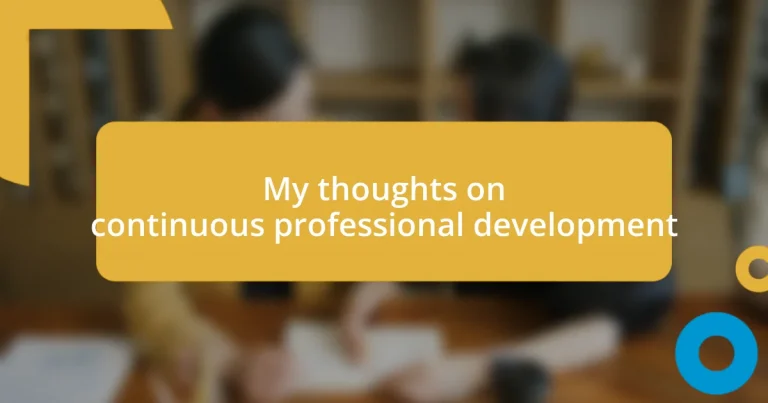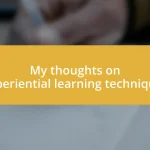Key takeaways:
- Continuous professional development (CPD) enhances both career and personal growth, emphasizing the importance of lifelong learning.
- Key strategies for effective development include seeking mentorship, conducting self-assessments, and actively networking to foster collaboration.
- Overcoming barriers such as time management, fear of failure, and resource limitations is critical, as is regularly evaluating development progress to celebrate achievements and identify areas for improvement.
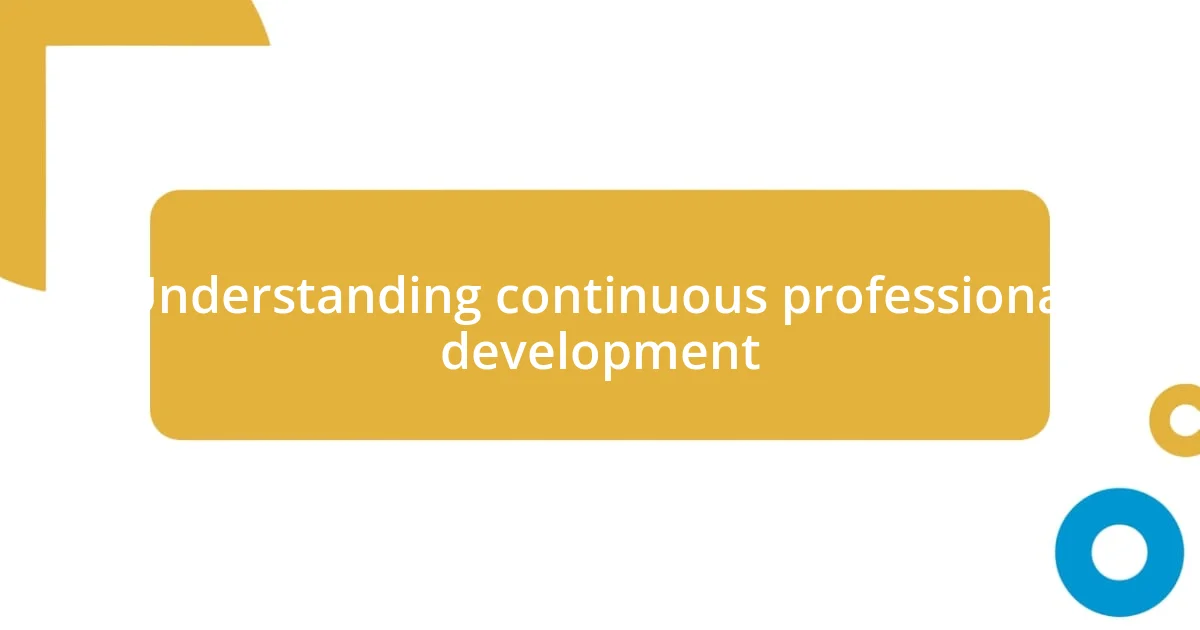
Understanding continuous professional development
Continuous professional development, often abbreviated as CPD, is about intentionally enhancing your skills and knowledge over time. I remember a time when I took a course on effective communication; it not only boosted my capabilities but also opened up new doors professionally. Isn’t it fascinating how small investments in our learning can yield significant returns in our careers?
Diving deeper, CPD fosters adaptability in a rapidly changing world. I’ve encountered technologies and methodologies that evolved so swiftly, I could hardly keep up. This constant evolution makes it crucial for us to embrace learning as a lifelong journey. How do you approach this learning curve? For me, I’ve found that setting specific goals helps keep me on track and motivated.
Lastly, CPD isn’t just about career advancement; it can also profoundly impact personal growth. I once joined a leadership workshop that pushed me out of my comfort zone. The connections I made and the insights I gained reshaped not just how I work, but who I am. When was the last time you invested in your own development? It can truly be a transformative experience!
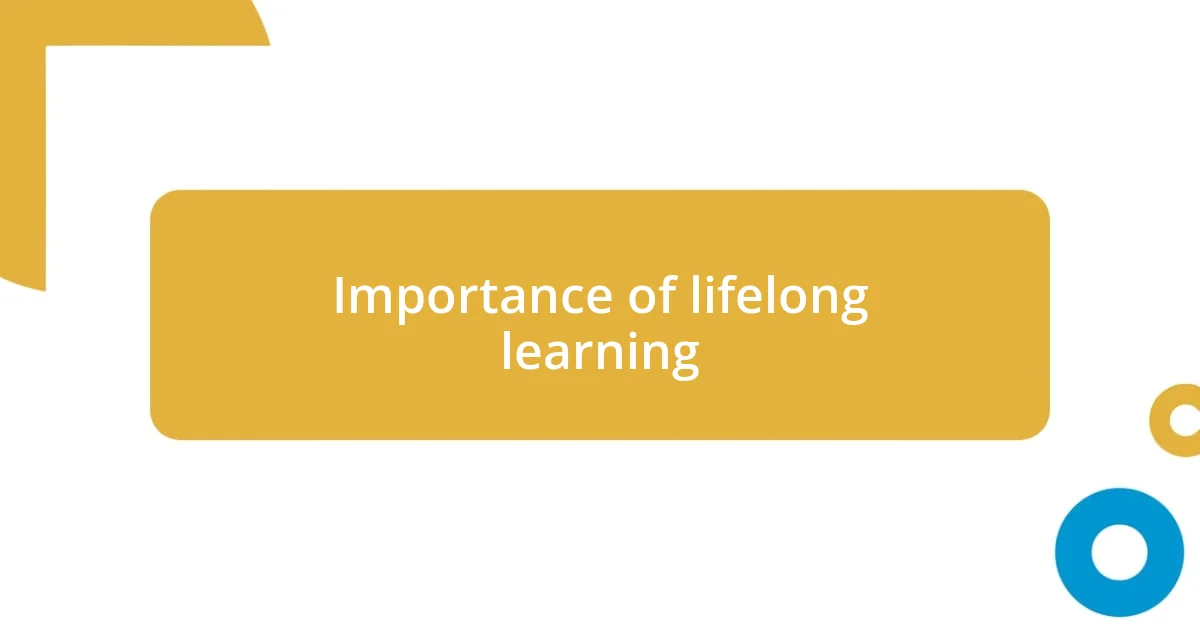
Importance of lifelong learning
Lifelong learning is essential in today’s fast-paced world. I vividly recall attending a recent industry seminar where I met a veteran colleague who had continuously evolved his expertise. His advice struck me: “Never stop learning, or you’ll be left behind.” This wisdom resonates deeply, as the landscape of our professions is ever-changing, and keeping our skills fresh is crucial for relevance and resilience.
- Embraces change: Lifelong learners can navigate shifts in their industry more effectively.
- Enhances employability: Staying updated makes you a desirable candidate in any job market.
- Fosters personal satisfaction: There’s a genuine joy in discovering new concepts and ideas.
- Improves problem-solving skills: Continuous exposure to learning aids in developing critical thinking abilities.
- Builds confidence: Gaining new skills boosts self-esteem, making you more assertive in your professional role.
Reflecting on this, I find that engaging in workshops or online courses not only keeps my skills sharp but also rejuvenates my passion for my field. After completing a recent online certification, I felt an invigorating sense of accomplishment that translated into my daily work. There’s something powerful about committing to lifelong learning—it transforms not just your career, but your entire outlook on life.
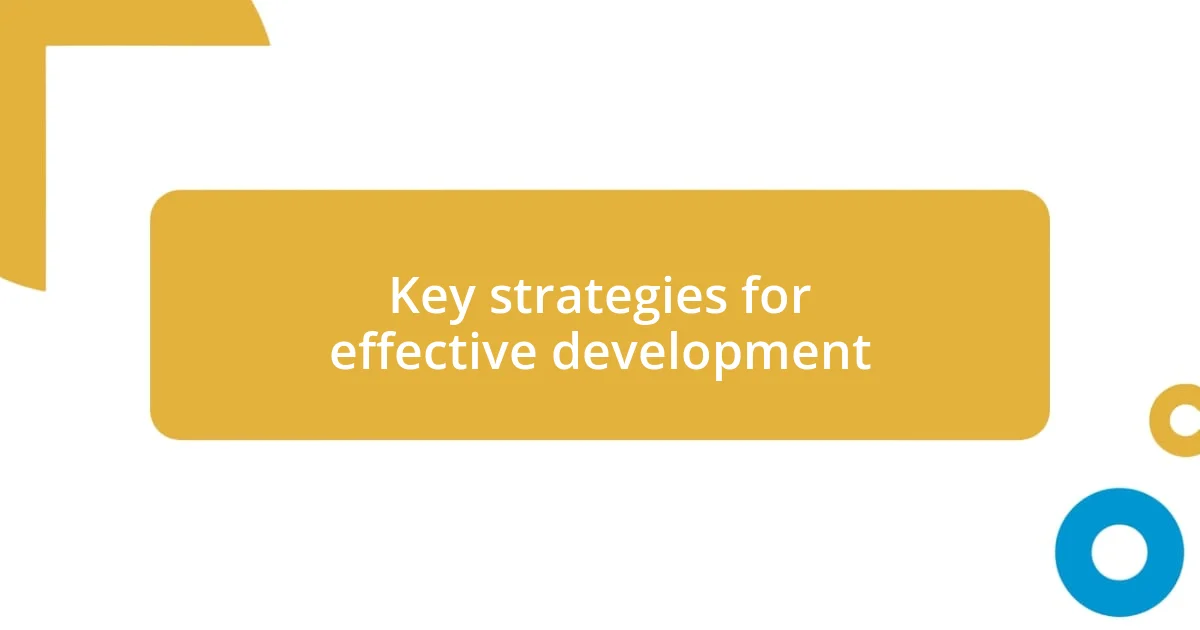
Key strategies for effective development
Continuous professional development thrives on a blend of strategies tailored to individual learning styles and career goals. I’ve found that actively seeking mentorship has been one of my most effective approaches. Engaging with experienced professionals creates a unique opportunity to gain insights from their journeys, which often highlights path shortcuts I wouldn’t have considered. Have you ever had a mentor who profoundly shaped your perspective? Their guidance can illuminate potential challenges and empower you to navigate your career more adeptly.
Another strategy I swear by is setting regular self-assessment periods. I like to periodically evaluate my skills and knowledge against industry standards. This not only keeps me accountable but also allows me to recalibrate my learning focus based on the skills I find most crucial for my growth. For instance, after a yearly assessment, I realized I needed to improve my data analysis skills, leading me to a specialized course that has since elevated my contributions at work.
Finally, participating in professional networks cannot be overlooked. Networking events have often sparked exciting collaborations for me, and they often emerge from casual conversations. The benefits extend beyond traditional learning; I’ve discovered opportunities to share knowledge, exchange ideas, and gain perspectives that challenge my existing beliefs. If you’re hesitant to join, consider this: How much could you gain from simply showing up? You might be surprised by the rich learning experience that lies within.
| Strategy | Description |
|---|---|
| Mentorship | Engaging with experienced professionals for guidance and insights. |
| Self-Assessment | Regularly evaluating skills against industry standards to identify improvement areas. |
| Networking | Building connections to foster collaboration and knowledge sharing. |
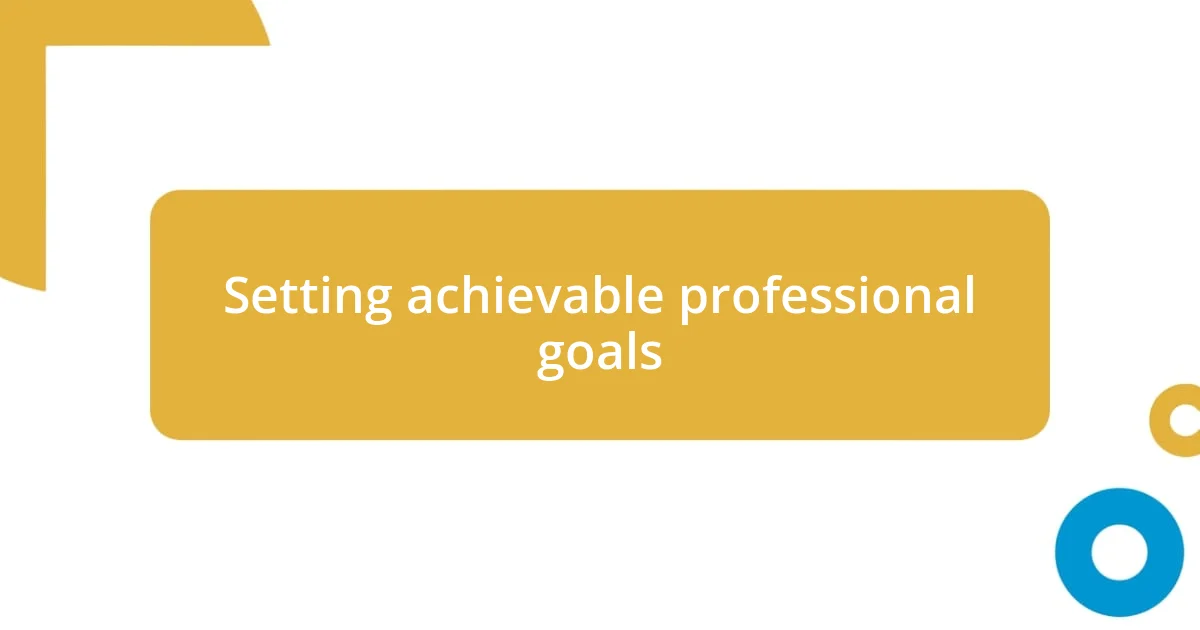
Setting achievable professional goals
When I think about setting achievable professional goals, I often reflect on a turning point in my career. I remember tackling a challenging project; my original goal felt overwhelming. However, I broke it down into smaller, manageable tasks. This approach not only made the project less daunting but also allowed me to celebrate small victories along the way. Have you ever experienced a similar situation where breaking goals into bite-sized pieces made all the difference?
Establishing SMART goals—Specific, Measurable, Achievable, Relevant, Time-bound—has been invaluable for my professional development. I frequently use this framework to clarify my objectives, ensuring they resonate with my aspirations and are realistic. For example, instead of saying, “I want to improve my leadership skills,” I set a goal to “lead a project team by the end of the quarter,” allowing me to track my progress. When your goals are clear and precise, it fosters a sense of purpose that drives you forward.
In my experience, flexibility is equally important in the goal-setting process. Goals shouldn’t become rigid prisons; they should allow for growth and adaptation. A few months ago, I aimed to learn a programming language but quickly realized my workload wouldn’t permit it. Instead of feeling defeated, I shifted my focus to online tutorials that could fit into shorter time slots. Adjusting my goal didn’t mean I failed; it enhanced my ability to learn within my busy schedule. How do you adjust your goals when life throws you a curveball?
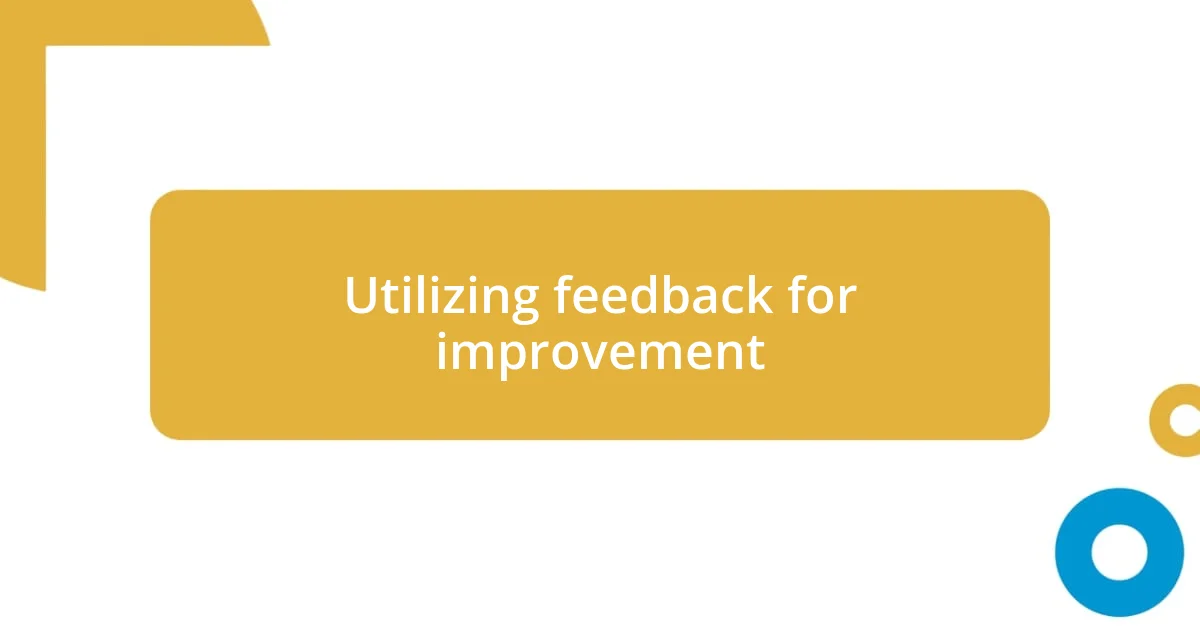
Utilizing feedback for improvement
Feedback can be a powerful catalyst for growth. I recall a time when I received constructive criticism on a presentation I’d delivered. At first, it stung a bit, but I took the time to digest the feedback and implemented the suggested changes in my next talk. The improvement in my delivery was evident, which deepened my appreciation for the importance of feedback. How might your work improve if you truly leaned into others’ perspectives?
Consistently seeking feedback can shift your mindset from one of defensiveness to openness. In my experience, after every project, I make it a habit to ask colleagues for their input on my performance. This not only fosters a culture of trust and collaboration but also unveils insights I might overlook. For instance, a colleague once pointed out that I tended to rush through my explanations. Embracing this feedback helped me slow down and engage my audience better, leading to more impactful interactions.
I’ve learned that utilizing feedback is not just about identifying areas for improvement; it’s also about recognizing what you’re doing well. Celebrating those strengths encourages a balanced approach to personal development. Reflecting on positive feedback I’ve received has motivated me to take on more complex tasks, knowing that my efforts were valuable and appreciated. So, have you ever thought about how acknowledging your strengths through feedback could inspire you to reach new heights?
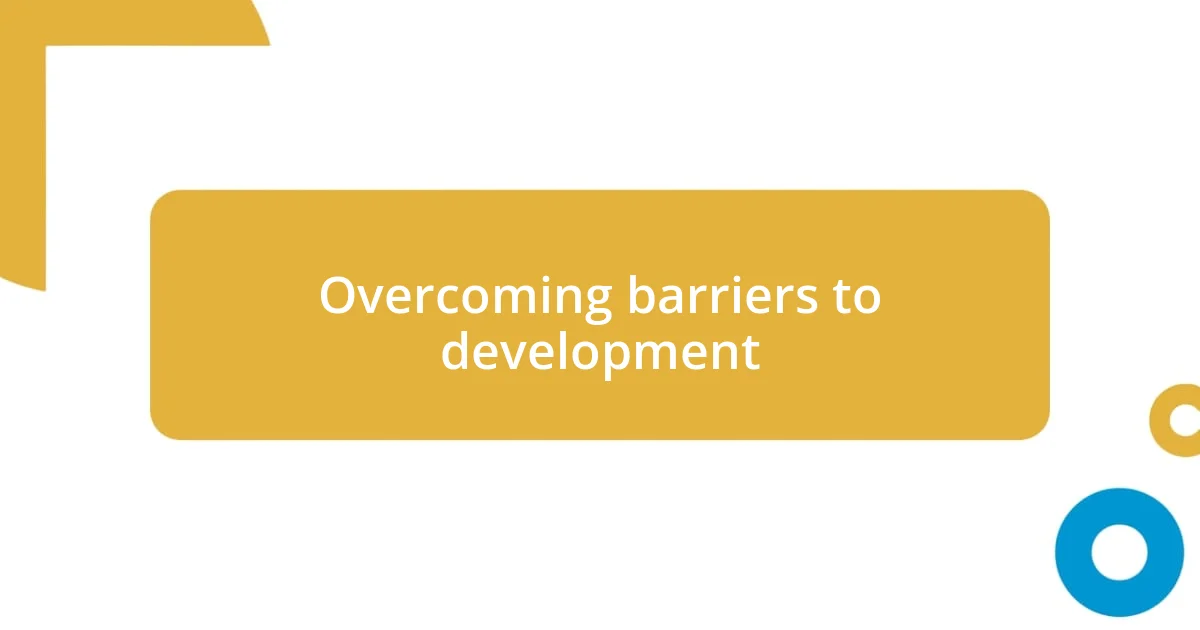
Overcoming barriers to development
As I reflect on my journey, I recognize that one of the most significant barriers to professional development is time management. There was a phase in my career when I felt overwhelmed by competing priorities—work demands, personal commitments, and the need to invest in my own growth. Have you ever felt like you simply didn’t have enough hours in the day? What I found was that carving out even small pockets of time for self-improvement made a world of difference. I started setting aside just 30 minutes a week to explore new skills, and that tiny shift transformed my learning trajectory.
Another barrier I’ve encountered is fear of failure. I remember hesitating to enroll in an advanced workshop, worried I wouldn’t grasp the material or keep up with others. That hesitation was palpable. Yet, I ultimately decided to push past that fear. I told myself that every expert starts as a beginner. Once I embraced that mindset, I learned not only the content but also gained confidence in my ability to tackle challenging material. Have you ever realized that overcoming fear often opens new doors for growth?
Lastly, resources can be a hurdle; whether it’s financial constraints or a lack of access to opportunities, it can feel discouraging. I once found myself limited by budget as I sought to attend a sought-after conference. Instead of giving in to frustration, I explored alternatives like virtual events or local meetups, and was surprised by the wealth of knowledge and connection I gained. It reminded me that sometimes, the path to development is less about availability and more about creativity. How do you navigate resource limitations in your pursuit of growth?
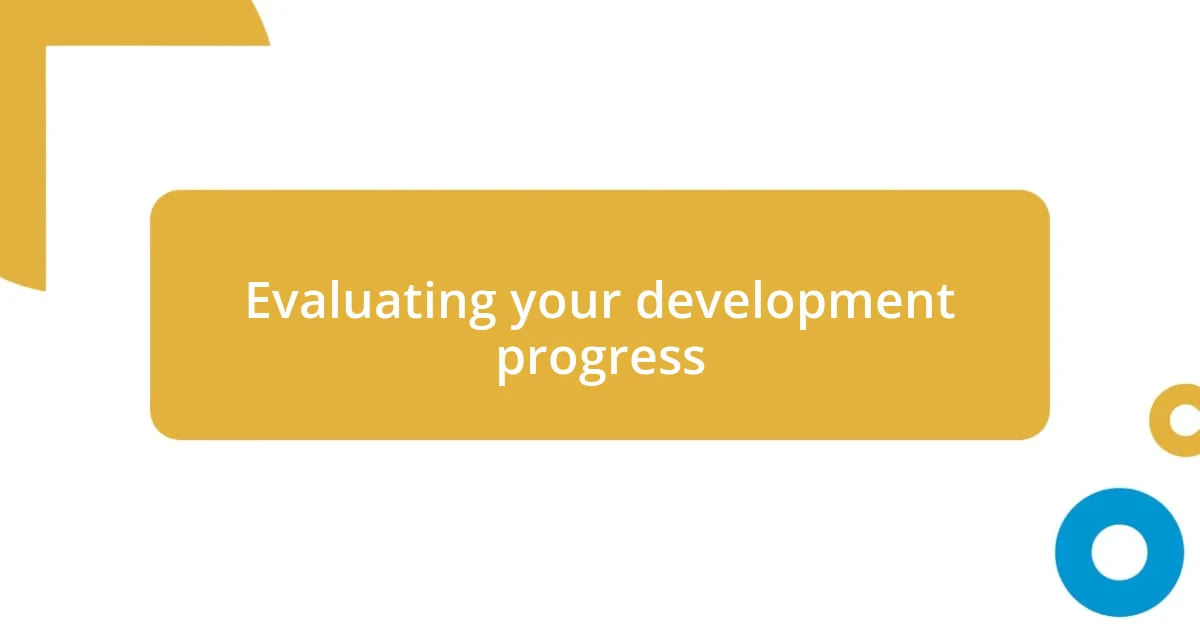
Evaluating your development progress
Evaluating your development progress is essential for recognizing how far you’ve come. I remember the first time I sat down to review my growth over a few months. I was surprised at the progress I had made in honing my communication skills, which I hadn’t fully appreciated until I documented specific instances where I felt more confident and clear in my interactions. Have you ever taken the time to map out your progress in such a tangible way?
Creating a structured evaluation process can significantly enhance your professional journey. I’ve found that setting measurable goals, like improving my project management capabilities, allows me to reflect on specific outcomes. For instance, after I transitioned to leading a project team, I tracked my ability to meet deadlines and team satisfaction through short surveys. This not only highlighted areas of success but also indicated where I could refine my approach. What metrics are meaningful for you in understanding your growth?
Regular reflection gives me the opportunity to celebrate my victories while also identifying areas for enhancement. I recall a quarterly review where I realized I had successfully implemented a new approach to team meetings that encouraged participation. Acknowledging this achievement bolstered my motivation to continue experimenting with innovative methods. Have you found a reflective practice that resonates with you, one that both celebrates and sharpens your development?












